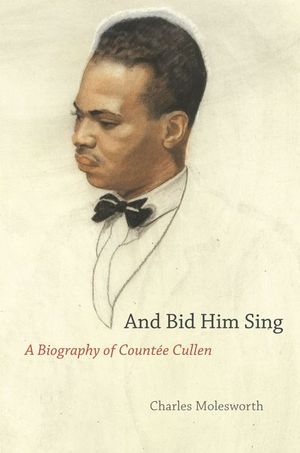And Bid Him Sing
Published by The University of Chicago Press
A full-length, critical biography examining the life and work of the poet and literary giant of the Harlem Renaissance.
While competing with Langston Hughes for the title of “Poet Laureate of Harlem,” Countée Cullen (1903–46) crafted poems that became touchstones for American readers, both black and white. Inspired by classic themes and working within traditional forms, Cullen shaped his poetry to address universal questions like love, death, longing, and loss while also dealing with the issues of race and idealism that permeated the national conversation. Drawing on the poet’s unpublished correspondence with contemporaries and friends like Hughes, Claude McKay, Carl Van Vechten, Dorothy West, Charles S. Johnson and Alain Locke, and presenting a unique interpretation of his poetic gifts, And Bid Him Sing is the first full-length critical biography of this famous American writer.
Despite his untimely death at the age of forty-two, Cullen left behind an extensive body of work. In addition to five books of poetry, he authored two much-loved children’s books and translated Euripides’ Medea, the first translation by an African American of a Greek tragedy. In these pages, Charles Molesworth explores the many ways that race, religion, and Cullen’s sexuality informed the work of one of the unquestioned stars of the Harlem Renaissance.
An authoritative work of biography that brings to life one of the chief voices of his generation, And Bid Him Sing returns to us one of America’s finest lyric poets in all of his complexity and musicality.
Praise for And Bid Him Sing
“At last! One can only be grateful to Charles Molesworth for this concise yet comprehensive biography of Countée Cullen, the shooting star of the Harlem Renaissance. This book sets the facts straight about a man whose childhood and inner life have been obscure despite his fame. More importantly, Molesworth reveals the complex intersections of racial loyalty and aestheticism, spirituality and sexuality, representativeness and individuality in the life and work of Harlem’s black prodigy, one of America’s most admired poets of the 1920s.” —George B. Hutchinson, author of The Harlem Renaissance in Black and White
“Cullen was a commanding literary figure whose accomplishments have often been diminished in studies of the Harlem Renaissance that emphasize his role as an antitype to Langston Hughes. Charles Molesworth rights this wrong in his fine biography whose subject is not only the struggles and triumphs of a singular American poet, but also the exciting social and literary world that produced him.” —Emily Bernard, author of Carl Van Vechten and the Harlem Renaissance
While competing with Langston Hughes for the title of “Poet Laureate of Harlem,” Countée Cullen (1903–46) crafted poems that became touchstones for American readers, both black and white. Inspired by classic themes and working within traditional forms, Cullen shaped his poetry to address universal questions like love, death, longing, and loss while also dealing with the issues of race and idealism that permeated the national conversation. Drawing on the poet’s unpublished correspondence with contemporaries and friends like Hughes, Claude McKay, Carl Van Vechten, Dorothy West, Charles S. Johnson and Alain Locke, and presenting a unique interpretation of his poetic gifts, And Bid Him Sing is the first full-length critical biography of this famous American writer.
Despite his untimely death at the age of forty-two, Cullen left behind an extensive body of work. In addition to five books of poetry, he authored two much-loved children’s books and translated Euripides’ Medea, the first translation by an African American of a Greek tragedy. In these pages, Charles Molesworth explores the many ways that race, religion, and Cullen’s sexuality informed the work of one of the unquestioned stars of the Harlem Renaissance.
An authoritative work of biography that brings to life one of the chief voices of his generation, And Bid Him Sing returns to us one of America’s finest lyric poets in all of his complexity and musicality.
Praise for And Bid Him Sing
“At last! One can only be grateful to Charles Molesworth for this concise yet comprehensive biography of Countée Cullen, the shooting star of the Harlem Renaissance. This book sets the facts straight about a man whose childhood and inner life have been obscure despite his fame. More importantly, Molesworth reveals the complex intersections of racial loyalty and aestheticism, spirituality and sexuality, representativeness and individuality in the life and work of Harlem’s black prodigy, one of America’s most admired poets of the 1920s.” —George B. Hutchinson, author of The Harlem Renaissance in Black and White
“Cullen was a commanding literary figure whose accomplishments have often been diminished in studies of the Harlem Renaissance that emphasize his role as an antitype to Langston Hughes. Charles Molesworth rights this wrong in his fine biography whose subject is not only the struggles and triumphs of a singular American poet, but also the exciting social and literary world that produced him.” —Emily Bernard, author of Carl Van Vechten and the Harlem Renaissance
BUY NOW FROM
COMMUNITY REVIEWS

